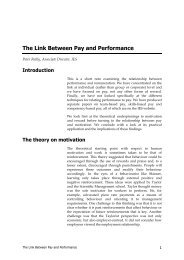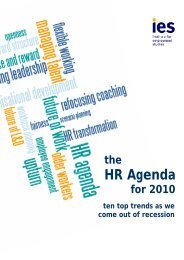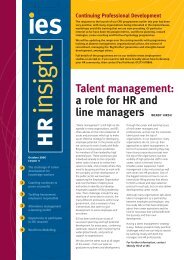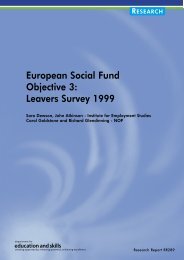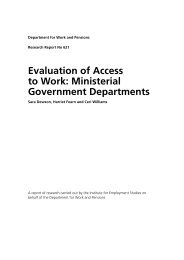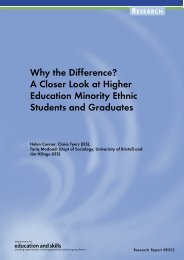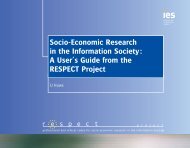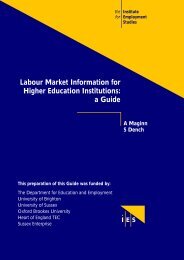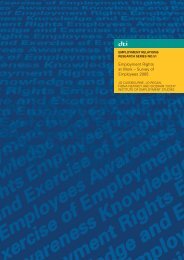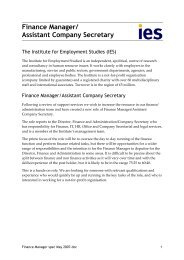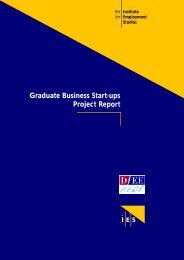Post-16 Transitions: a Longitudinal Study of Young People with ...
Post-16 Transitions: a Longitudinal Study of Young People with ...
Post-16 Transitions: a Longitudinal Study of Young People with ...
You also want an ePaper? Increase the reach of your titles
YUMPU automatically turns print PDFs into web optimized ePapers that Google loves.
However, he was finding this new course difficult and no additional<br />
support had been made available to him although Devesh had<br />
made his need for support clear prior to admission and support<br />
time was available for use. However, the course tutor said that<br />
they received little information about new students from the SEN<br />
Department and relied on their own in-course assessments. His<br />
mother explained that Devesh was struggling to keep up in a<br />
mainstream college <strong>with</strong>out the support that they expected he<br />
would have.<br />
Devesh had already thought about dropping out <strong>of</strong> the course, but<br />
had decided to try to complete it, <strong>with</strong> a view to transferring later<br />
to another college where he could do a course that was very<br />
similar to the Essential Skills course <strong>with</strong> which he had started.<br />
Despite this apparently circular movement, there were prospects <strong>of</strong><br />
real progression to employment for Devesh. Through college, he<br />
had already had contact <strong>with</strong> a Disability Employment Adviser and<br />
she was able to outline a number <strong>of</strong> employment opportunities in<br />
the long term. In her words:<br />
“I think he will successfully gain employment. It may take a<br />
little longer than others may but I am confident that he will<br />
find a suitable job. We will make sure that we are there to<br />
provide support in times <strong>of</strong> change eg nature <strong>of</strong> work or<br />
staff, as we find that this can be disruptive. He may require<br />
further support or coaching at a later stage having got the<br />
job.”<br />
The model is clear. While most young people (in principle at least)<br />
make a linear progression from school to further education,<br />
training and employment, for young people <strong>with</strong> special<br />
educational needs, these things “take a little longer”. The role <strong>of</strong><br />
the post-<strong>16</strong> phase, therefore, is to hold them out <strong>of</strong> the labour<br />
(and, initially, training) market until they are sufficiently mature<br />
and to stimulate that maturation by providing appropriate<br />
experiences and training.<br />
Unresolved issues<br />
As the examples above illustrate, the problems in the deferred<br />
transition model tend to come not so much during the course <strong>of</strong><br />
the first activity post-<strong>16</strong>, which may be relatively unchallenging,<br />
but in the efforts that then have to be taken to make more<br />
decisive progress thereafter. This is true <strong>of</strong> young people <strong>with</strong> very<br />
different types and levels <strong>of</strong> difficulty. Carl, for instance, has<br />
severe autism and is in the sixth form <strong>of</strong> the same school for<br />
children <strong>with</strong> severe learning difficulties that he has attended since<br />
he was eight. His transition to the sixth form at age <strong>16</strong> was to all<br />
intents and purposes automatic. So is the next step which is<br />
planned for him; transition to one <strong>of</strong> two local FE Colleges to<br />
follow a Life Skills course. There has been some discussion as to<br />
which one would suit Carl best, but the decision is now virtually<br />
made and Carl’s parents have opted for the one which can <strong>of</strong>fer a<br />
full-time, three-year placement. School and college have wellestablished<br />
links, they meet regularly to discuss individual students<br />
and Carl is already spending one day per week in the college. The<br />
consensus is that this second transition has been well prepared for<br />
<strong>Post</strong>-<strong>16</strong> <strong>Transitions</strong> <strong>of</strong> <strong>Young</strong> <strong>People</strong> <strong>with</strong> SEN: Wave 2 83



